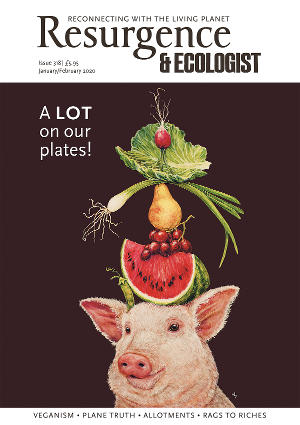In his preface to Green and Prosperous Land, Dieter Helm reminisces about the picturesque scenery of his grandfather’s mixed farm in the Essex countryside, a place of harmonious farming and wildlife abundance. From this idyllic picture, he moves on to describe our current dire situation: our environment and wildlife are in trouble, our perverse subsidy system is wrecking the British countryside, and we need to act now to rescue our green and pleasant land. And the way to do it, Helm argues, is through a ‘natural capital’ approach. This approach suggests that by inserting Nature into the economic system and giving the ‘assets’ and ‘public goods’ that it provides an economic value, we will save Nature from further destruction. To change the practices that are polluting the environment and destroying Nature, we need to put a price on Nature and use this as a deterrent for further degradation as well as to fund conservation.
Helm’s arguments are powerful, if not always sound, and though my first reaction is one of uneasiness about this market-driven approach, Helm makes some important points, and some of his principles (such as that polluters should pay) are potentially effective. I agree with many of his observations about pollution, wildlife decline and general environmental degradation, but as he starts to unfold his plan I feel the vision slipping through the cracks in his arguments. There are many inconsistencies, clashes and omissions. The second part of the book descends into a convoluted and hazy series of programmes, plans, revisions and committees with many potential benefits but very little actual detail and a great deal of ambiguity and bureaucracy. In the process, ecosystems are broken down into elements to price, compare and trade, ignoring the fact that an ecosystem functions as a complex whole and is not just a collection of items that can be separated into individual goods and services. The plan Helm presents cannot deal with such complexity: Nature and economics work in different ways.
Helm presents many of the issues at hand as false either/or dilemmas between the worst-case scenario of doing nothing, and following his plan. He offers many vague and incomplete scenarios to support his proposal and often dismisses other approaches (such as agro-ecological farming and local food systems) as impractical or unfeasible romantic ideas (even though he starts the book with just such an image from his grandfather’s farm). At the same time, he brushes aside the many practical difficulties his plan would encounter and argues that the details will be worked out at a later date. It feels like Helm is at pains to keep an internal consistency within his various arguments in the book, but in doing so he leaves many questions unanswered. All along he fails to acknowledge the role of the neoliberal economic system in creating our present tragic situation.
So, whilst I agree about the need for change – and some of the principles Helm states could certainly play a role in creating a greener Britain – the suggestion of giving monetary value to various dismembered parts of Nature in order to save it is problematic, and even more so when the blueprint that Helm presents is simply not robust enough. Rather than trusting the future of Nature to a system whose obsession with growth has caused the problem in the first place, we would do better looking at real alternatives to bring about social, economic and political change. But you won’t find that kind of answer in this book: according to Helm, “We don’t have to go back to Nature, become austere and abandon capitalism,” we just need to add a new form of capital, and the market will bring a green and prosperous future. But will it?







